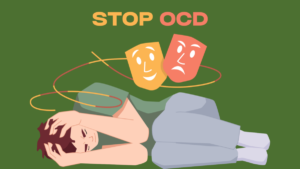OCD is a debilitating mental disorder that affects one’s ability to live a normal, functional life. It’s characterized by obsessive thoughts, repetitive behaviours, and irrational fears. For some people, OCD is a slow killer that takes away their ability to work or socialize. Fortunately, there are ways to fight back against OCD and restore balance to your life. This blog post will offer tips on how you can stop OCD from taking over your life and how you can deal with it in the most effective way possible. From cognitive-behavioural therapy to medication and more, read on for all the information you need to take back control of your life.
Contents
OCD And Its Causes

OCD is a disorder that people with it experience recurrent intrusive thoughts (images, ideas, or sensations that cause distress) and repetitive behaviours (repetitive actions or mental rituals). It can be incredibly debilitating, making it difficult to live a normal life. There is no one cause for OCD, but it can often be traced back to childhood experiences or genetics.
There is currently no cure for OCD, but there are treatments available that can help manage the condition. Some of the most common treatments include medication and Cognitive Behavior Therapy (CBT). CBT is an approach that focuses on changing the way you think about your obsessions and compulsions in order to reduce their impact on your life.
How to Deal With OCD
If you are struggling with OCD, here are some tips to help you get started:
1. Recognize that OCD is a disorder and it needs to be treated like one. This means that therapy and medication are essential for treatment. Don’t try to fix OCD on your own; professional help is required.
2. Establish specific goals for therapy and work towards them one step at a time. Make sure you keep up with your progress by keeping a diary or journal and discussing your challenges and successes with your therapist.
3. Seek out support groups or online forums that focus specifically on OCD. These can be an invaluable resource for sharing tips, coping mechanisms, and encouragement. Plus, they can provide social interaction which can be helpful in suppressing negative thoughts and behaviors associated with OCD.
4. Keep things as normal as possible so you don’t feel overwhelmed by the demands of the disorder. This means avoiding anything that might trigger obsessive thoughts or behaviors, such as being around people who have strep throat or attending religious services where there is a lot of coughing or sneezing involved. Try to schedule regular activities around periods of relative calm so you don’t feel pressured to do too much at once.
5. Take care of yourself physically and emotionally; neglecting either can lead to further breakdowns in mental health). Get enough sleep, eat healthy foods, engage in regular physical activity, take breaks when needed, and talk about any concerns you have with someone
Where Do OCD Thoughts Come From?
 OCD thoughts are often unpredictable and unwelcome, popping into your head at the worst times. But where do they come from?
OCD thoughts are often unpredictable and unwelcome, popping into your head at the worst times. But where do they come from?
The roots of OCD thoughts can be traced back to a combination of genetic and environmental factors. OCD is a heritable condition, meaning that it is passed down through families. It’s also been found that people with OCD are more likely to have close family members with the condition. This can lead to repetitive thinking and behavioural patterns being passed down from one generation to the next.
Additionally, stressors in your life can also contribute to the development of OCD thoughts. Experiencing traumatic events, for example, can lead to intrusive thoughts about death or disaster. Constant worry or stress can also overload your brain and create unwanted obsessions and compulsions.
If you’re struggling with OCD thoughts, there are plenty of resources available to help you get relief. Treatment options include medication, therapy, and self-help books. If you find that pursuing conventional therapies isn’t working for you, consider seeking out alternative treatments such as neurofeedback or mindfulness meditation. Whatever route you choose, be persistent – OCD won’t stand in your way indefinitely!
6 Ways To Stop OCD Thoughts From Coming
 Given below are 6 ways to stop OCD:
Given below are 6 ways to stop OCD:
1. Practice mindfulness meditation to control your thoughts and emotions
Mindfulness meditation trains your attention on the present moment. When you focus on your breath, you can challenge intrusive thoughts and mental chatter by returning your focus to the here and now.
2. Talk to someone about what’s going on for you
Talking to someone who understands OCD can be a helpful way to cope with the disorder. Talking about your thoughts and feelings can help you to process them and develop better strategies for managing them.
3. Take short breaks throughout the day to clear your head
Stress can lead to intrusive thoughts and obsessions, so it’s important to take short breaks every few hours to clear your head and relax. This will help you to regain control over your thoughts and emotions.
4. Practice cognitive behavioural therapy (CBT)
CBT is a type of psychotherapy that helps people learn how to manage their thoughts and behaviours. CBT teaches individuals how to challenge their irrational thoughts and replace them with more rational ones. this can help you to reduce the power of OCD thoughts.
5. Get exercise regularly
Physical activity has been shown to have a positive effect on mental health, including reducing anxiety and depression symptoms. Exercise can also promote positive thinking habits, which can help you manage OCD thoughts effectively.
6. Get support from loved ones and family members
OCD can be a hard condition to deal with on your own. If you need some support, reach out to your loved ones or family members. They may be able to provide emotional support and practical advice as you work through your disorder.
Talking about OCD symptoms with a friend or family member can provide support and help dispel any myths or misconceptions about the disorder. It may also give you some ideas for dealing with anxious thoughts on an ongoing basis.
Do OCD Thoughts Go Away If You Ignore It?
OCD thoughts are intrusive and repetitive, often going round and round in your head. It can be really hard to stop thinking about them or to ignore them. But there are some things you can do to help.
One way is to make a list of all the thoughts that are bothering you. Once you have a list, try to think about each one in turn, and ask yourself whether it is really worth spending your time on. If the thought is based on something that happened in the past, for example, consider what happened and why it matters. In case the thought is just annoying or frustrating, then sometimes it’s best to just let it go.
If the thought is causing distress or anxiety, then you may need to deal with it more directly. You could try talking about the thought with someone else or writing about it. Sometimes it can be helpful to focus on different thoughts for a short period of time each day – this will help break the cycle of thinking about OCD thoughts constantly.
When Should You Take Medical Help?
 If you are experiencing obsessive thoughts and compulsive behaviours that interfere with your daily life, it is important to seek professional help. OCD can be a debilitating mental illness, and if left untreated, it can lead to severe distress and even suicide. However, there are many things you can do to manage OCD on your own.
If you are experiencing obsessive thoughts and compulsive behaviours that interfere with your daily life, it is important to seek professional help. OCD can be a debilitating mental illness, and if left untreated, it can lead to severe distress and even suicide. However, there are many things you can do to manage OCD on your own.
There is no one-size-fits-all answer to this question, as the best time to seek medical help will vary depending on the severity of your symptoms and how well you are managing them on your own. However, some things to keep in mind include:
If your OCD is causing significant distress or interfering with your ability to function normally, it is likely that you need professional help. However, if you are feeling better Overall but continue having occasional episodes of OCD behaviour, it may be helpful to practice self-care techniques (such as accepting compliments calmly instead of trying not to blush) and track your progress over time.
If you experience any type of physical symptom associated with OCD (e.g., persistent headaches, stomachaches, dizziness), it is important to see a doctor for an evaluation. This is because some physical symptoms may be indicative of a more serious underlying problem that requires professional intervention.
How Long Does It Take To Cure From It?
OCD is a mental disorder characterized by intrusive, repetitive thoughts and images that are difficult to control. It can be very disabling and cause significant distress. There is no one-size-fits-all approach to treatment, but typically medication and therapy are used in combination.
There is no set timeline for treating OCD, but it typically takes around 12 weeks for the full effect of therapy to be seen. Some people experience immediate relief following treatment, while others take longer to fully recover. Regardless of how long it takes, always keep in mind that you are not alone and there is help available.
Conclusion
OCD is an incredibly frustrating condition to deal with, but there are ways to combat it. By understanding what OCD is and how it works, you can start to make changes in your life that will help you manage the disorder. In addition, seeking out professional help can be a huge factor in overcoming OCD. If you are struggling with OCD and feel like there is no hope for recovery, please reach out for help.
For more information and guidance, please contact OCDMantra. OCD is a mental health disorder characterized by obsessions and compulsions. If you have any queries regarding OCD treatment, OCD Counseling, ERP therapy experienced therapists at OCDMantra can help: Book a trial OCD therapy session


